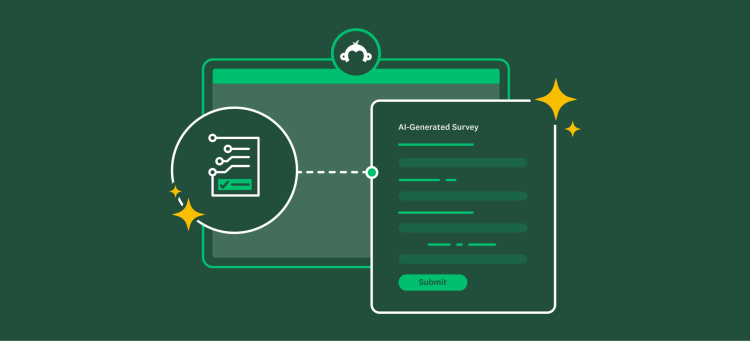Do you thrive in an office, energized by the bustle around you and the organic opportunities for collaboration and connection? Or do you work better in a workspace at home, with quiet to help you focus, more efficient workflows, and more time to spend with your family? Or maybe a little bit of both?
At SurveyMonkey, our employees get to choose—working in-person, fully remote, or a hybrid model that combines the two. Everyone makes their first elections when they’re hired, and they have a chance to revisit it again every year.
Adopting this model took a lot of careful thought, and posed some difficult questions. But as a company dedicated to collecting feedback and amplifying voices, we’ve realized that employees are never going to fit into one box, and that instead of trying to guess what they need, we’re better off asking.
Our “choice model” is the result of careful research, and we think it’s better for both our employees and the workforce overall.
Why we decided to reimagine work
At SurveyMonkey, we aspire to be “a place where the curious come to grow” and offer an environment where employees can do the best work of their lives. In 2020, we proved to ourselves that we could adapt, work, and collaborate differently than we ever have before and still deliver some of our best work as a team. We also learned that delivering our best work isn’t tied to being in our offices. It’s about clarity of mission, collaboration with colleagues, more equitable experiences, productive time to work, the grace to balance commitments, and taking care of one another.
We believe that choice, or a hybrid model of work, IS the future of work. It leverages everything we’ve learned about remote work and puts employees in the center of decision-making. It positions SurveyMonkey to attract and retain the best talent—and also win with our customers.
Our vision for Choice at SurveyMonkey enables teams to come together for important collaboration, community, and learning, all of which is essential for delivering for our customers, building trust and relationships, and investing in ourselves.
- Preserves important time free of meetings to find your flow, get in the zone, and be productive.
- Supports your ability to make an impact, integrate your life and work in a way that works best for you, and embraces flexibility.
- Creates a necessary balance of freedom and accountability. We #trusttheteam to deliver your fair share and meet your commitments to the team and customers in exchange for the freedom to work more flexibly.
- Creates a more inclusive experience in which team all-hands, staff meetings, and town halls are virtual.
How we used feedback to develop the choice program
Employee feedback has played a crucial role in shaping the choice program from inception to execution.
First, we used feedback to get an initial sense of interest. We knew that having such a fluid system would require some planning, and we wanted to go into it with our employees’ preferences relatively known. When our first survey found that 81% of employees wanted to work from home at least 2 to 3 times per week, we had a clear direction for how to focus our efforts.
Later, we used surveys to collect our employees’ elections—remote, in-person, or hybrid. This made it easy to get a sense of distribution and plan things like office resourcing and covid safety measures. Here’s how it breaks down today:
- ~50% fully remote
- ~45% hybrid
- ~5% fully in-office
Collecting feedback also helped us understand why employees were making the choices that they were, and what they were excited or concerned about. It helped us clarify our priorities for crafting both in-person and digital workplaces.
Many people said that they remember our in-office experiences fondly—collaborating with our colleagues, engaging as a community, and learning and growing together as teams. And, although they’d been productive at home, they also missed both the office and each other. Their feedback made it clear that the purpose of our offices is to foster collaboration, community, and learning. So that is where we will continue to focus our energy and investments for our offices.
We’ve also learned one size does not fit all, and hybrid work is not without its challenges. Our path forward will involve investing in new tools and technology, rethinking meetings, preserving time for productive work, and prioritizing equitable experiences for our colleagues around the world.
SurveyMonkey employees on how they made their choice
Eighty-four percent of our employees feel choice in where they work positively impacts their work experience. But one thing that our feedback made clear is that everyone has their own individualized reasons for what works best for them. Here are a few examples.
Remote: “As a new mom working remote, SurveyMonkey's flexibility allows me to be there for the special moments and contribute to my company in a positive way.”--Rachel, Account Executive, Sales
Hybrid:“As someone with ADHD, I often struggle to focus with all of the distractions of the office. Hybrid gives me the flexibility to stay home and get my work done in a quiet environment, as well as come to the office to collaborate and socialize. My commute can be pretty long too, so I love getting that time back!” —Tegan, Recruiter, Talent Acquisition
In-office: “I chose in-office for the separation of my work and home space, for the office facilities like better internet, printer and AV facilities, etc. and for the opportunity for planned cross-functional collaboration and spontaneous interaction with my colleagues. Not to mention the awesome lunch perk!”—Dan, Senior Manager, Legal
How choice helps us prioritize inclusion
Diversity, equity, and inclusion (DEI) is a core value at SurveyMonkey, and it influenced our decision to adopt the choice model. Having flexibility about where you work has major advantages for all employees, but it can be especially helpful for certain communities—many of whom are traditionally marginalized in the workforce. We want to make a special effort to support these groups and—as always—live our values.
Parents and caregivers: This is one of our biggest employee demographics. Whether it’s a lactating new mother who needs privacy to pump, a man with an aging parent who wants to stay close to ensure they’re safe, or a frazzled parent that simply needs to get out of the house to have a place to focus, we know that flexibility is a huge asset for this group.
Neurodivergent people: People with autism, ADHD, PTSD, or anxiety can often struggle with hectic environments. Loud, busy offices can sometimes make it impossible for them to do their jobs. Having the chance to work remotely or have a few days of quiet can be game-changing. choice makes it easier for us to support these employees—without them having to ask for special accommodation.
People with disabilities: The benefits of remote work can also be life-changing for people with physical disabilities, like chronic illnesses that make travel tiring or require frequent trips to the doctor’s office. It enables them to work from the comfort of home, where they have ready access to the resources they need.
At the same time, we realize that other people with disabilities might prefer to go to work. In a recent interview with SurveyMonkey, Natasha Walton of Tech Disability Project shared the story of a woman who is hard of hearing and has trouble reading lips on Zoom. Having access to meeting rooms with in-person coworkers and TV-sized video conferencing tools would make all the difference for an employee like that, so we want to ensure that those are available to employees in cities where we have an office, too.
The choice mode at SurveyMonkey is a reflection of our culture. Culture is not tied to our offices; it’s the sum total of our experiences—beginning with our shared mission to power the curious. It is demonstrated in how we live our values, and is brought to life by both the amazing people here today and those who laid the foundations upon which we build. We are a global community, and together we are building the kind of company we all want to work for.




